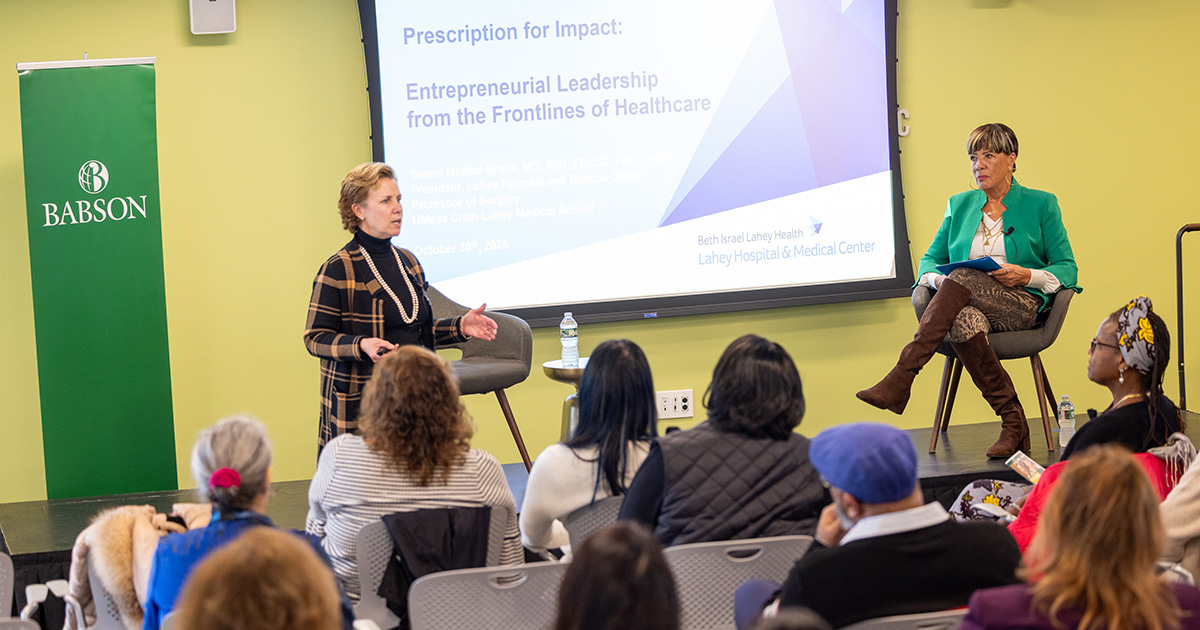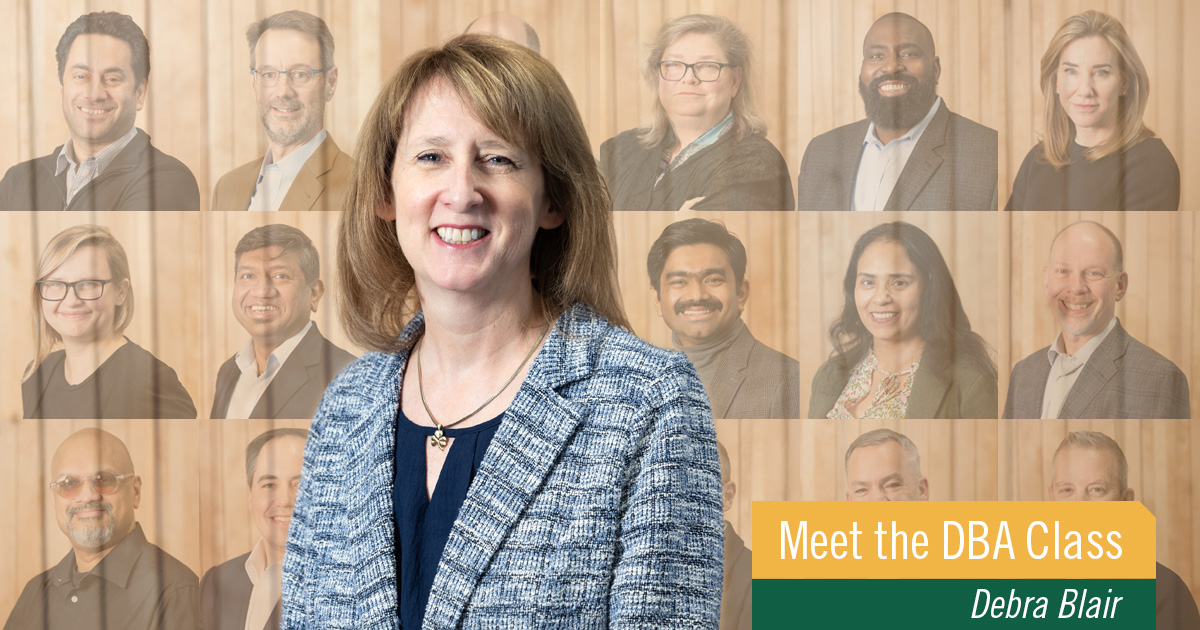How Can the Healthcare Industry Innovate? Here’s What Babson Experts Say

The healthcare industry—plagued with problems and ripe for solutions—is a lot like most other large, sprawling industries in need of entrepreneurial leadership, with one major difference.
That was the topic of conversation last week at Babson Boston, where Jane Edmonds P’21, vice president for programming and community outreach at Babson, hosted “Prescription for Impact: Entrepreneurial Leadership from the Frontlines of Healthcare” and a discussion with Dr. Susan Moffatt-Bruce, divisional president, Beth Israel Lahey Health, and president of Lahey Hospital & Medical Center. The event, which attracted physicians, healthcare providers, and business leaders, was part of Babson’s Entrepreneurial Leadership Advantage Series.
Moffatt-Bruce spoke about the technological solutions and innovations at Lahey and how they could help improve how the industry thinks about providing care. And, Edmonds, posed a question that distinguishes health care from other industries. “At Babson, we pride ourselves on educating our students about Entrepreneurial Thought & Action® (ET&A™),” she said. “What does that mindset look like in health care, because it’s a field where risk taking could be truly a matter of life and death?”
Moffatt-Bruce’s reply was frank: “We don’t train the entrepreneurial mindset. We do not teach our students often to think outside of the box, to think creatively, and we need to do so, which is why truly (we), working with Wiljeana (Glover) and others at Babson, are really creating a new paradigm in health care,” she said. “We have to think differently. The solutions that we were trained to invoke previously will not meet the challenges of tomorrow. That will take some courage, it will take some investment of resources, and it will most definitely take time, but we have to do it.”
An associate professor at Babson, Glover is the founding faculty director and the current research director of the Kerry Murphy Healey Center for Health Innovation and Entrepreneurship, as well as the Stephen C. and Carmella R. Kletjian Foundation Distinguished Professor of Global Healthcare Entrepreneurship.
Glover and Errol Norwitz, the new executive director of the KMH Center, attended the discussion, and we asked them for their thoughts on entrepreneurial leadership and innovation in health care.
Wiljeana Glover
What was your biggest takeaway from the topics that were discussed?
“For me, my largest takeaway was the importance of action, that it is one thing to analyze current conditions, to recognize that patient complexity is increasing, cost is increasing. All of those challenges are true. How do we find opportunities where we can collaborate across disciplines to actually evoke change? And, so, it was very inspiring.”
A lot of the focus on innovation was about technology and artificial intelligence. From your perspective, how do you view the discussions around AI in health care?
“As an academic, we’ve seen this coming for a long time. AI has captured the public imagination but has been around for quite some time. I’ve been really fortunate to work with Tom Davenport (President’s Distinguished Professor of Information Technology and Management), Dessislava Pachamanova (Professor and Zwerling Family Endowed Term Chair), and others at Babson on this topic for quite a while. I think Dr. Moffatt-Bruce’s approach to taking a very measured, thoughtful approach to how they implement any new technology, AI included, is valuable. They recently started an innovation hub, and that is going to be their sandbox for testing new technologies. We encourage such efforts to field these technologies so that healthcare organizations can take a data-driven, patient-centered approach toward implementation.”
“Our goal is really to take Babson’s approach to Entrepreneurial Thought & Action and bring it to health care, so that we can think about clinical outcomes and financial outcomes simultaneously.”
Wiljeana Glover, founding faculty director and current research director of the Kerry Murphy Healey Center for Health Innovation and Entrepreneurship
How important is it to bring an entrepreneurial mindset to a field such as health care, and where does Babson fit in that?
“At the Kerry Murphy Healey Center for Health Innovation and Entrepreneurship, our goal is really to take Babson’s approach to Entrepreneurial Thought & Action and bring it to health care, so that we can think about clinical outcomes and financial outcomes simultaneously. I think that’s really where we can be effective and valuable for our partners. And, so as a group, as an institution, we have partnered with several healthcare organizations, including Lahey, to support some of their operational endeavors, some of their more entrepreneurial endeavors, and I think there continues to be great promise between our faculty and students for more to come.”
Errol Norwitz
What was your biggest takeaway from this discussion?
“It’s hard to innovate. Innovation means changing the way we consume and deliver health care, and it’s very hard to do in a big system. You can’t truly innovate in a big healthcare system. It’s just too conservative. And it’s not their fault. That’s the way the system is designed.
“Jane Edmonds talked about systems. You have to change the system. There are three problems in health care. You have to improve clinical outcomes, improve the end user experience, both for the patient and the provider, and you have to address the cost of care. And health care is unique, because you have to solve all those three problems at the same time, and if you don’t, you’re going to fail.
“For academicians and entrepreneurs, they’re different mindsets. Academicians fall in love with the problem. Entrepreneurs fall in love with the solution, and often their solution. They’re different mindsets. What you need to do—which (Moffatt-Bruce) alluded to—is to partner. You have to bring the academicians together with the entrepreneurs, and it’s these partnerships that are going to truly revolutionize health care. You can’t do it yourself.”
“Academicians know what the problems are; entrepreneurs have solutions. You put them together, and it’s like a secret sauce, and that’s what we can do at Babson with health care.”
Errol Norwitz, executive director of the KMH Center
If academics and entrepreneurs work together, can that produce innovation?
“That’s why I’ve come to Babson, because here we have the ability to bring the entrepreneurial mindset, which Babson is all about, together with the academicians, and create an environment (to solve problems). Academicians know what the problems are; entrepreneurs have solutions. You put them together, and it’s like a secret sauce, and that’s what we can do at Babson with health care, so I’m really excited.”
For somebody in your position with your background in the field, now at Babson, is there hope?
“Yes, there are solutions. I know because I trained and worked in many countries where they have come up with solutions. The technology is here. It’s the implementation that’s failing, and it’s the political courage and leadership that’s failing. That’s what we need right now. It can be fixed.”




